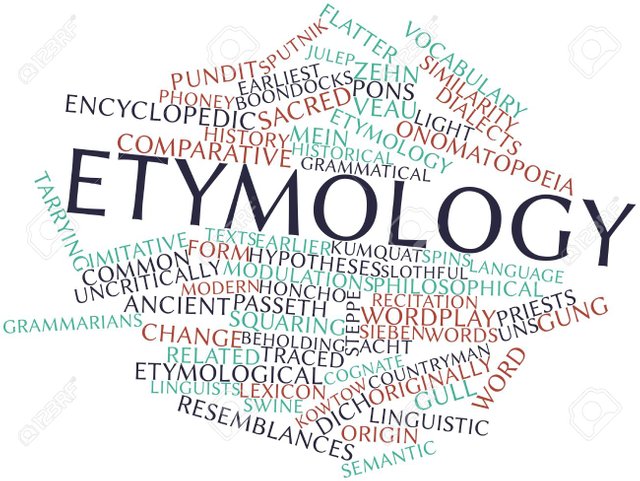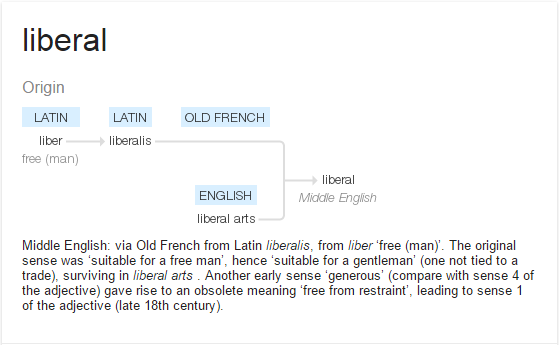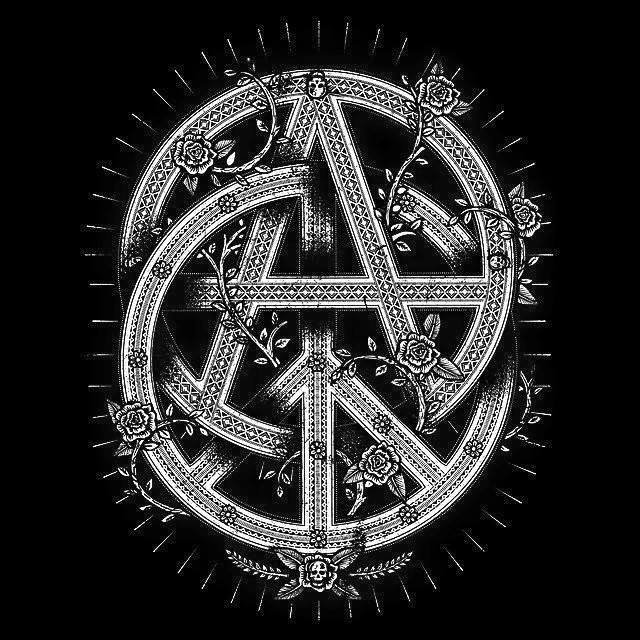Word of the Week, Ep.1: "Liberal"
I'm Back!
The nagging demands of the statist servile society has kept me away from Steemit recently. Sometimes, when trying to subvert the seemingly ubiquitous reach of "authority," there doesn't seem to enough time, enough energy, or even enough willpower to go on.
But, in an effort to incentivize myself, I've come up with an idea that I think will benefit readers of this blog and me at the same time.
As the title of this post suggests, I plan on taking one word every week and defining it, breaking down the actual meaning by tracing the words etymology and looking at how the original usage and connotation of the word have changed from its original creation.
(Maybe it will turn into Word of the Day in the future).

Knowledge is the Key to Understanding
Grammar, or the knowledge we take in, is the first step to logic, understanding and wisdom. It is the starting point of our journey through reason that will distinguish fact from fiction.
Today we are drowning in information. But is all the information right, or even relevant? And how are we to know? If the information we are given is false or incomplete then it stands to reason that the conclusion would be false as well.
Much like the concept of newspeak in George Orwell's 1984, our language has been bastardized to have no meaning other than what the State says. This has largely lead to a lack of understanding which ultimately has produced unquestioning, unthinking followers of "authority." In other words ... zombies!
It is important to truly understand the meanings of words that we use every day to understand and process all the information being thrown at us and separate the factual information from that which has been designed to deceive and obfuscate the truth.
Word of the Week: "Liberal"
Living in the South, in the conservative bible belt, I hear this term used in a derogatory sense a lot as well as somewhat creative variations like "libtard." The most well known connotation of the word is in the false left, right dichotomy of liberal and conservative or, respectively, left vs. right. I must point out again that this is a false dichotomy and a very effective use of the Hegelian Dialectic. While the use of dialectics is another topic for another time, it has some relevance to how the connotation of the word changed over time.
Definition
willing to respect or accept behavior or opinions different than one's own; open to new ideas
1.1) favorable to or respectful of individual rights and freedoms
1.2) favoring individual liberty, free trade, and moderate political and social reformconcerned with broadening a person's general knowledge and experience, rather than with technical or professional training.
given, used, or occurring in generous amounts.
(especially of an interpretation of a law) broadly construed or understood; not strictly literal.
Etymology
From Latin Liberalis, Liber; meaning free (man), suitable for a free man, unimpeded, independent, outspoken, licentious, unrestrained.
Liber was also used for the word book and is where we get the term library and liberty.
Library - librarium - liber; book, book case, chest for books.
Liberal as an adjective meant; generous, nobly born or noble, free, selfless, magnanimous and admirable. Old French connotation was; befitting free people and in the 18th century meant free from prejudice, tolerant, not biggoted or narrow.
In reference to political opinion, "tending in favor of freedom and democracy fro. 1801 French libéral. In English, the label was first applied by opponents to the party more favorable to individual political freedoms.
More recently in U.S. politics tending to mean, "favorable to government action to effect social change."

Now that the word has been broken down, defined, and traced back there should be a clearer understanding of its meaning. I think it is interesting that in Latin liber means both book and free. They associated freedom with knowledge. It's obvious when you look at the words library and liberty that this connection was realized by the creators of the English language.
The more we understand the information we take in, the easier it is to separate truth from fiction. Literacy is slavery unless critical thinking is applied.
-Aahabb

References:
https://en.oxforddictionaries.com/
https://www.online-latin-dictionary.com/
Img. Source:
http://theunityprocess.com/wp-content/uploads/2015/07/liberal-etymology
It really is a shame that so many people with really bad ideas and agendas started hiding behind this word. Bastardizes sums it up pretty well.
Very true. Even more shameful is there are so many more words that have been bastardized. Most people have learned to speak the language but have no idea what it actually means.
Great idea for an ongoing series! I wholly support the view that we need to be more deliberate about our use of language; fostering a deeper understanding of the words we use and the nuances of their meaning.
Etymologies - as you have demonstrated - give us a broader perspective on how thoughts are connected. The words book (representing the recording and sharing of knowledge) and freedom (unimpeded, authentic expression of will) both springing forth from a common root, points to the axiomatic realization that understanding and application of true knowledge is the means by which man is set free.
Typically, one would not look to the mere study of language for philosophical insight; but as you have shown (and will no doubt continue to show), this can be a source of profound and practical understanding.
Truth will out in surprising and variable ways.
Thank you. The lack of understanding of simple language we use from day to day is, I think, one of the main problems that lead to lack of critical thinking. People just take words at face value like reading headlines and not the article or accepting a piece of information as fact without asking one question.
There are a lot of words that, if studied, can show the true meaning of what they suggest.
Everything in reality was first manifested in thought. For words to manifest in reality they have to be thought of, as abstractions. And just like the concept of freedom and knowledge was connected through the word "liber," other concepts have been connected and can show the true implications of a word as created to reflect or describe reality.
Absolutely, brother. Keep on keeping on! I look forward to following this new series.
Upvote this: https://steemit.com/free/@bible.com/4qcr2i
You got a 100.00% upvote from @whalecreator courtesy of @anarchoaahabb! Delegate your Steem Power to earn 100% payouts.